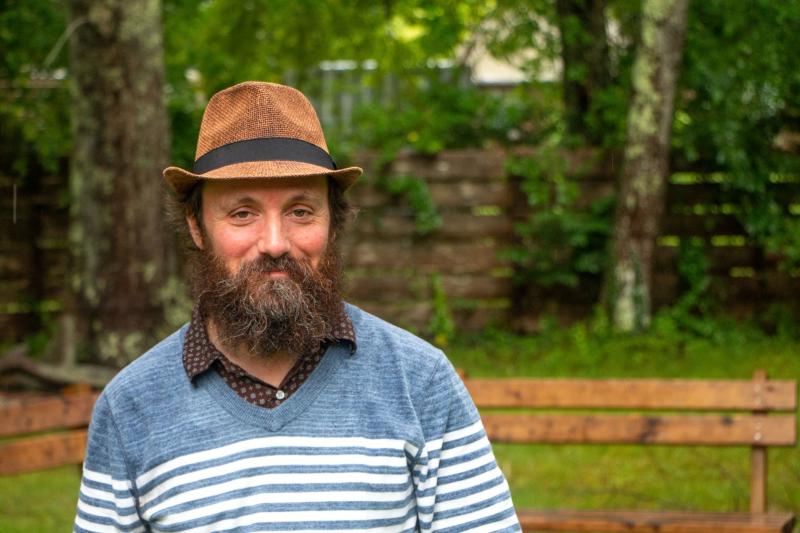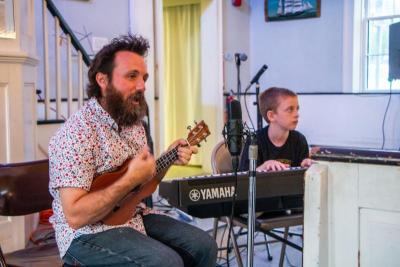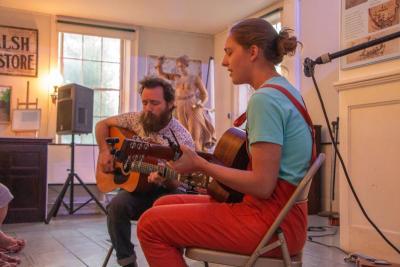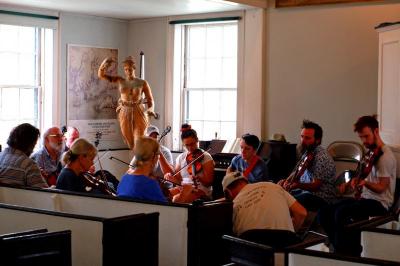The pandemic shut down his musical community events, the rest is history
MATTAPOISETT — It was a temperate July evening as villagers filled the pews of the Mattapoisett Museum and began to talk quietly amongst themselves, almost as churchgoers before an evening sermon.
The seats were nearly full by the time the show began and many musical instruments — from acoustic guitars to ukuleles and fiddles — could be seen resting on knees amongst the crowd.
They had come to see a show and to perform, but most of all they came to Open Mic Night to feel like part of a community again — to play their music for a real audience, and to support others to do the same.
The show’s organizer, a short man with a scraggly beard and kind eyes, addressed the crowd with a voice that was overwhelmingly welcoming but not at all authoritative. His tone seemed to say “I’m just along for the ride, same as everyone else.”
Jeff Angeley has been organizing events like these for years: community gatherings that bring people together using music as the catalyst. In fact, creating that sense of community has become something of a raison d’etre for him — a central focus that shapes most of what he does.
“Everything that I do these days is community music oriented,” he said. “I pretty much try to focus all my external work — my music performing work — on building events that anybody can participate in if they want to, that bring other people in.”
For years, Angeley operated a studio space at Hatch Street Studios in New Bedford where he taught music lessons and hosted events like Open Mic Night and others such as Old Time Fiddle Sessions and Silent Movie Nights set to live music.
Angeley’s goals were to create a place for people to perform and enjoy music with minimum pressure and maximum participation, and in that studio his work thrived.
At its height, Angeley had five other music teachers working out of the studio, dozens of students coming and going for group and individual lessons, and a reliable following for his events.
That changed in March 2020, when he had to shut his doors and find a way out of the year-long lease he signed a month prior.
“The pandemic was really hard on me,” he said. “I couldn’t keep my employees there, I couldn’t even really use it to work.”
Angeley’s entire business, like so many others, was forced out of its in-person space and onto the internet in a matter of days.
Luckily, he said, he had some experience in virtual teaching, but it was a challenging move all the same.
“The good thing is, I had always had some virtual students,” he said. “So when the pandemic hit, it was not a learning curve for me to get onto a video chat to teach a lesson. It was more about teaching my student base how to come with me, which was really helpful.”
Kevin Whelan, who has taken clawhammer banjo lessons from Angeley for about 2 years, said that Angeley’s experience with online music teaching made the process of switching to remote lessons much easier.
“All things considered [the Zoom lessons] went really well,” he said, adding that it “got to be much easier when the video chat quality improved.”
Whelan said he now appreciates the flexibility of being able to take some of his lessons online when he can’t make it to Mattapoisett from his home in Bridgewater.
For Angeley, the harder part of the pandemic was figuring out a way to continue the community events that had become such an important part of his work, without being able to bring the community together in person.
Angeley said that he experimented with virtual events for about three months after shutting down his studio, but the latency of the video meeting platforms made it impossible to play music all together.
“So it was more like there were a whole bunch of people on-screen, muted and me playing tunes at a moderate tempo, and I assumed that they were playing the same tunes at their place,” he said.
Eventually, Angeley decided to stop the events entirely and though his lessons continued — sometimes virtually, sometimes in his backyard when the weather was good, sometimes in his garage when people felt comfortable — the experience was draining for him.
“When it was predominantly virtual for a really long time, I had my moments of considering whether this was really what I wanted to do, because that connection is kind of what I’m after,” he said. “I didn’t become a music teacher to get rich, you know?”
Luckily, after 11 months without events, the world began to reopen and a new venue presented itself to Angeley.
Jessica DeCicco-Carey, who recently became a member of the Mattapoisett Museum Board of Directors, has known Angeley for years as her daughter’s fiddle teacher. So when she realized that he didn’t have a space to hold his events anymore, everything clicked into place and she approached him about holding them at the museum.
DeCicco-Carey said that what Angeley does fits well with the path the museum wants to take to become more of a community venue, and the response from the first few shows has solidified that feeling.
“It was a huge success, we had tons of people come and watch,” she said of the first open mic night at the museum, adding the relationship with Angeley is mutually beneficial.
“People come in that don’t usually come to the museum and they usually leave a donation,” she said.
Angeley also characterized the events as symbiotic because even though he doesn’t make any money from them directly — all the open-participation events are free admission — they are a good way of getting his name out in the community.
“The reason I do the events is not because they are a promotion for the business, I don’t even put out materials about the business at the events, but it is one of the reasons I’m able to work,” he said. “You know, people see me at events and that’s where they think to inquire about things.”
So far, then, the relationship between Angeley and the Mattapoisett Museum has gotten off to a good start with the open mic nights and Old Time Fiddle Sessions now penciled in for monthly performances.
There have even been discussions about trying the silent movie nights with live musical accompaniment at the museum, but logistics for hanging a projection screen still need to be worked out.
The next shows will be this weekend with open mic night on Friday, Aug. 20 at 6 p.m. and Old Time Fiddle Sessions on Sunday, Aug. 22 at 1p.m., and DeCicco-Carey said the museum is excited to be able to host.
“It’s so refreshing to see life in the museum again,” she said. “I think everybody missed that community connection and the face-to-face interactions.”


















